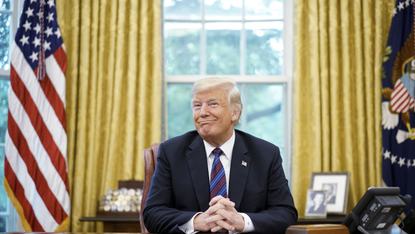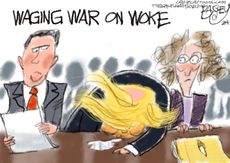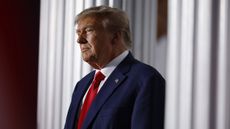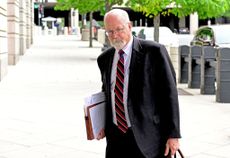‘We live in Nixonland – where presidents determine what is and isn’t legal’
Your digest of analysis from the British and international press

- 1. Ripping and burning: how Trump White House handled some legally protected documents
- 2. Unions don’t call the shots any more – but we’d all be better off if they did
- 3. State school pupils put in real effort during Covid but two-tier system fails them
- 4. Try putting the high heel on the other foot
- 5. We can’t blame Prince Charles if he didn’t want to live in Buckingham Palace, it’s spooky with awful carpets
1. Ripping and burning: how Trump White House handled some legally protected documents
Julian Zelizer at CNN Opinion
on recording keeping
“In one form or another, most presidents have violated the Presidential Records Act,” writes Julian Zelizer at CNN Opinion. But former president Donald Trump’s actions amount to “egregious violations of a law that came about in the aftermath of President Richard Nixon’s traumatic Watergate scandal” requiring the “proper preservation of presidential records”. The US has recently learned that Trump “made a habit of tearing up documents” and there have been reports of “staffers putting documents in burn bags to be destroyed”. “At least 15 boxes of documents and other items” went with Trump to Florida when “his term came to a tumultuous close” too. The “fundamental problem” with the legislation is “there isn’t a strong enforcement mechanism. The entire process depends on administrations acting in good faith”. Unless this is addressed, “we will continue to live in Nixonland – a world in which the president determines what is and isn’t legal”. For every American, “that’s a dangerous place to be”.
Subscribe to The Week
Escape your echo chamber. Get the facts behind the news, plus analysis from multiple perspectives.

Sign up for The Week's Free Newsletters
From our morning news briefing to a weekly Good News Newsletter, get the best of The Week delivered directly to your inbox.
From our morning news briefing to a weekly Good News Newsletter, get the best of The Week delivered directly to your inbox.
2. Unions don’t call the shots any more – but we’d all be better off if they did
Larry Elliott at The Guardian
on today’s workforce
The 1972 battle of Saltley Gate “holds a special place” for “those versed in trade union folklore”, says Larry Elliott at The Guardian. Birmingham factory workers “downed tools to support striking miners”, and the action proved “pivotal” in winning the miners’ strike. Today is the 50th anniversary of Saltley Gate, and though “there is much talk about how Britain is returning to the 1970s”, the “detour down memory lane” shows “how fatuous” the comparisons are. Four million of the 6.6m trade union members today are public sector workers, “while those in the lowest-paid, highly casualised sectors, who would benefit most from the support of a trade union, are least likely to be members of one”. Power has shifted “too far in favour of employers”, Elliott says, “and even the Conservatives can sense there is a problem”. There are some “positive signs”, like the TUC being involved in designing the furlough scheme, and the increase to the national living wage. “All that said, a piece of the jigsaw is still missing, and that is unions.”
3. State school pupils put in real effort during Covid but two-tier system fails them
Eva Simpson at The Mirror
on inequaltiy in education
Parents who pay for their children’s education “want bang for their buck and boy did they get it” last year, says Eva Simpson at The Mirror. An investigation has revealed “private schools ‘gamed’ the system after the pandemic forced the cancellation of exams” and teachers were left to determine students’ grades instead. “Surprise surprise, children in fee-paying schools scored highest.” This isn’t “just about questionable grade inflation”, says Simpson. While private school pupils “switched seamlessly to online classes”, “for many state school kids there often were no lessons from teachers for months”. “Private sector kids could log in from any number of devices” but “other children, especially those in more deprived parts of the country, were scrabbling for laptops and tablets, struggling with Wi-Fi issues and parents who didn’t have enough data”. Simpson fears this will “exacerbate” inequality. “Education is meant to be the great leveller, but the playing field has never been so unequal.”
4. Try putting the high heel on the other foot
Janice Turner at The Tmes
on blame games
“There’s a handy test to ascertain whether criticism is sexist,” says Janice Turner at The Times: “ask how a man would be treated in a similar situation.” Lord Ashcroft’s unauthorised autobiography contains allegations that Boris Johnson’s wife has meddled in his decisions for several years. So, “let’s pretend Carrie Johnson’s alleged crimes were committed by the spouse of a female prime minister”, says Turner. Imagine “Denis Thatcher pressured his wife to ensure safe passage of caddies from Kabul golf club” during the evacuation of civilians from Afghanistan last August. “It would still be a political scandal.” And if “key members of Wimbledon Conservative Association, where Philip May was briefly chairman, were fast-tracked into Downing Street with the best man at their wedding seated outside the prime minister’s door”, Turner asks, “would this not be news?” In each hypothetical case, as with the accusations against Carrie, “the prime minister is ultimately to blame. But Philip or Denis would have been seen as having full ‘agency’ in such acts”. Denying Carrie of this is “what’s truly sexist”.
5. We can’t blame Prince Charles if he didn’t want to live in Buckingham Palace, it’s spooky with awful carpets
Esther Walker at the i news site
on changing rooms
“It’s no secret that Prince Charles doesn’t love Buckingham Palace,” says Esther Walker. And while some may think this proves “he is spoilt and silly”, the i news site’s writer gets it. Years ago, she “ended up” in a “massive official building after hours, which is probably the closest I will ever get to being in Buckingham Palace”. It was “hands down, the spookiest place” she’d ever been, and she imagines “if you lived there, it would be impossible to relax.” The Queen’s London residence “must be like this”, she says. “It’s probably why [Meghan] ran a mile.” There’s the “hideous carpets and revolting gilding; the sheer volume of memories at every turn”, and the “inescapable evidence that you live at the expense of the taxpayer”, Walker says. “Decrepit for years”, the palace is now being renovated, and sources say Charles will move in once he’s king. “Charles somehow now understands that we don’t care what he wants”, and that being in the Palace is “the only set-up that we, their judgemental and capricious masters, can handle”.
Create an account with the same email registered to your subscription to unlock access.
Sign up for Today's Best Articles in your inbox
A free daily email with the biggest news stories of the day – and the best features from TheWeek.com
-
 'Good riddance to the televised presidential debate'
'Good riddance to the televised presidential debate'Instant Opinion Opinion, comment and editorials of the day
By Harold Maass, The Week US Published
-
 Caitlin Clark the No. 1 pick in bullish WNBA Draft
Caitlin Clark the No. 1 pick in bullish WNBA DraftSpeed Read As expected, she went to the Indiana Fever
By Peter Weber, The Week US Published
-
 Today's political cartoons - April 16, 2024
Today's political cartoons - April 16, 2024Cartoons Tuesday's cartoons - sleepyhead, little people, and more
By The Week US Published
-
 Flies attack Donald Trump
Flies attack Donald TrumpTall Tales And other stories from the stranger side of life
By Chas Newkey-Burden, The Week UK Published
-
 Donald Trump criminal charges for 6 January could strain 2024 candidacy
Donald Trump criminal charges for 6 January could strain 2024 candidacySpeed Read Former president’s ‘pettifoggery’ won’t work well at trial, said analyst
By Chas Newkey-Burden Published
-
 AfD local election win: watershed moment for far-right in Germany?
AfD local election win: watershed moment for far-right in Germany?Talking Point Discontent over immigration and Berlin’s green policies appears to have fuelled support for populist party
By Jamie Timson Published
-
 Donald Trump in the dock: a fraught moment for US democracy
Donald Trump in the dock: a fraught moment for US democracyTalking Point There is speculation that former president could end up running his 2024 election campaign from behind bars
By The Week Staff Published
-
 Donald Trump indicted again: is latest threat of prison a game changer?
Donald Trump indicted again: is latest threat of prison a game changer?Today's Big Question The former president ‘really could be going to jail’ but Republicans ‘may not care’ say commentators
By Chas Newkey-Burden Published
-
 Trump told he could face charges over classified Mar-a-Lago documents
Trump told he could face charges over classified Mar-a-Lago documentsSpeed Read A second criminal indictment is on the cards for the former US president and current Republican frontrunner
By Sorcha Bradley Published
-
 The return of Donald Trump to prime-time television
The return of Donald Trump to prime-time televisionfeature CNN executives have been condemned over the former president’s televised town hall
By The Week Staff Published
-
 Durham criticizes FBI, offers little new in final report on 4-year Trump-Russia investigation review
Durham criticizes FBI, offers little new in final report on 4-year Trump-Russia investigation reviewSpeed Read
By Peter Weber Published